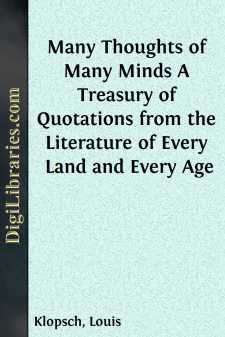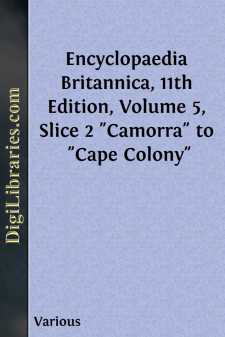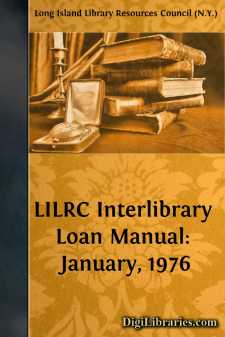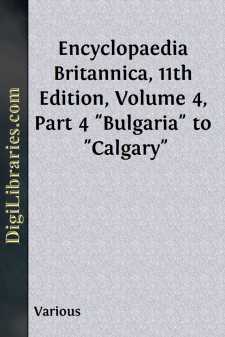Reference
- Atlases 1
- Bibliographies & Indexes 10
- Catalogs 55
- Dictionaries 1
- Encyclopedias 43
- Etiquette 14
- Handbooks & Manuals 19
- Heraldry 2
- Quotations 9
Reference Books
Sort by:
by:
Louis Klopsch
Many Thoughts of Many Minds. Ability.—No man is without some quality, by the due application of which he might deserve well of the world; and whoever he be that has but little in his power should be in haste to do that little, lest he be confounded with him that can do nothing.—Dr. Johnson. We judge ourselves by what we feel capable of doing, while others judge us by what we have already...
more...
by:
Various
BEDLAM, or Bethlehem Hospital, the first English lunatic asylum, originally founded by Simon FitzMary, sheriff of London, in 1247, as a priory for the sisters and brethren of the order of the Star of Bethlehem. It had as one of its special objects the housing and entertainment of the bishop and canons of St Mary of Bethlehem, the mother-church, on their visits to England. Its first site was in...
more...
by:
Walter Cox Green
ADDRESSING ENVELOPES. MEN. A man should be addressed as Mr. James J, Wilson, or James J. Wilson, Esq. Either the Mr. or the Esq. may be used, but not the two together. The title belonging to a man should be given. It is not customary to use Mr. or Esq. when Jr. or Sr. is used. WOMEN. A woman's name should always have the Miss or Mrs. A woman should never be given her...
more...
by:
Various
DODWELL, EDWARD (1767-1832), English traveller and writer on archaeology. He belonged to the same family as Henry Dodwell the theologian, and was educated at Trinity College, Cambridge. He travelled from 1801 to 1806 in Greece, and spent the rest of his life for the most part in Italy, at Naples and Rome. He died at Rome on the 13th of May 1832, from the effects of an illness contracted in 1830 during...
more...
by:
Various
EDWARDES, SIR HERBERT BENJAMIN (1819-1868), English soldier-statesman in India, was born at Frodesley in Shropshire on the 12th of November 1819. His father was Benjamin Edwardes, rector of Frodesley, and his grandfather Sir John Edwardes, baronet, eighth holder of a title conferred on one of his ancestors by Charles I. in 1644. He was educated at a private school and at King’s College, London....
more...
by:
Various
CAMORRA, a secret society of Naples associated with robbery, blackmail and murder. The origin of the name is doubtful. Probably both the word and the association were introduced into Naples by Spaniards. There is a Spanish word camorra (a quarrel), and similar societies seem to have existed in Spain long before the appearance of the Camorra in Naples. It was in 1820 that the society first became...
more...
INTERLIBRARY LOAN POLICIES AND PROCEDURES Our interlibrary loan program is based on the premise that lending among libraries for the benefit of individuals in Nassau and Suffolk counties is in the public interest and should be encouraged. It is impossible for any one library to be self-sufficient, and interlibrary borrowing and lending is regarded by the libraries participating in this program as...
more...
by:
Various
ARAM, EUGENE(1704-1759), English scholar, but more famous as the murderer celebrated by Hood in his ballad, theDream of Eugene Aram, and by Bulwer Lytton in his romance ofEugene Aram, was born of humble parents at Ramsgill, Yorkshire, in 1704. He received little education at school, but manifested an intense desire for learning. While still young, he married and settled as a schoolmaster at Netherdale,...
more...
by:
Anonymous
EXAMINATION QUESTIONSFIRST SERIES 1. Q. What do you consider essential for your success in regard to the use of ? A. I deem it essential to my success to be as economical in the use of fuel and supplies as is consistent with the work to be performed, exercising good judgment in my work, harmonious co-operation with my engineer, and showing a willingness to learn and practice the best methods in my...
more...
by:
Various
BULGARIA (continued from part 3) ... the mean interval being 60 m.; the summits are, as a rule, rounded, and the slopes gentle. The culminating points are in the centre of the range: Yumrukchál (7835 ft.), Maragudúk (7808 ft.), and KadimlÃa (7464 ft.). The Balkans are known to the people of the country as the Stara Planina or "Old Mountain," the adjective denoting their greater size as...
more...











